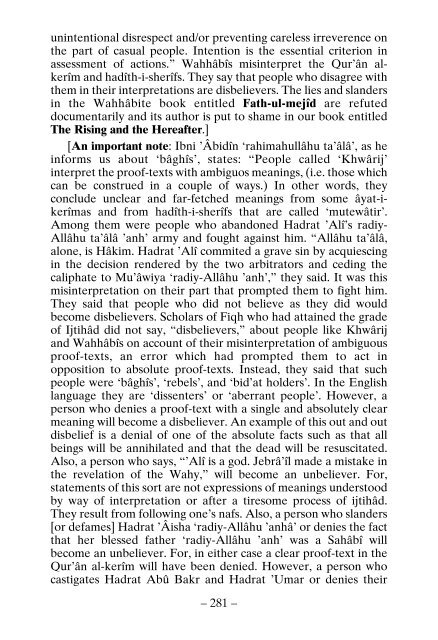O Son !
THE BOOK ‘O SON’ Al-hamdu lillâhi Rabbil ’âlamîn. Wa-s-salâtu wa-s-salâmu ’alâ Rasûlinâ Muhammadin wa Âlihi wa Sahbihi ajma’în. 1– O son! Collecting from books written by the scholars of the Hanafî Madhhab three hundred and sixty hadîth-i-sherîfs and forty-four khabars and also the seven essentials and the five rukns and the seven wâjibs and the fourteen sunnats and the twenty-five mustahabs and the fourteen mufsids of namâz, I have explained them for you. Adapt your acts and deeds to these teachings so that you attain fayz and nejât (salvation)! 2– Also for your information, I have collected a thousand and ninety âdâb (adabs) for you and for other young Muslims like you. If you adapt your actions and acts of worship to these teachings, they will be sufficient for you. If you laze, disobey Allâhu ta’âlâ and cease from these practices and manners, you will be afflicted with slavery and disgrace in the world and subjected to torment in the world to come. If you live up to them and advise your Muslim brothers to do the same, it will be useful for you. They will say blessings over you. And Haqq ta’âlâ will accept their invocations. For, a slave will be pardoned on account of another slave’s invocations for them.
THE BOOK ‘O SON’
Al-hamdu lillâhi Rabbil ’âlamîn. Wa-s-salâtu wa-s-salâmu ’alâ
Rasûlinâ Muhammadin wa Âlihi wa Sahbihi ajma’în.
1– O son! Collecting from books written by the scholars of the
Hanafî Madhhab three hundred and sixty hadîth-i-sherîfs and
forty-four khabars and also the seven essentials and the five rukns
and the seven wâjibs and the fourteen sunnats and the twenty-five
mustahabs and the fourteen mufsids of namâz, I have explained
them for you. Adapt your acts and deeds to these teachings so that
you attain fayz and nejât (salvation)!
2– Also for your information, I have collected a thousand and
ninety âdâb (adabs) for you and for other young Muslims like you.
If you adapt your actions and acts of worship to these teachings,
they will be sufficient for you. If you laze, disobey Allâhu ta’âlâ
and cease from these practices and manners, you will be afflicted
with slavery and disgrace in the world and subjected to torment in
the world to come.
If you live up to them and advise your Muslim brothers to do
the same, it will be useful for you. They will say blessings over you.
And Haqq ta’âlâ will accept their invocations. For, a slave will be
pardoned on account of another slave’s invocations for them.
Create successful ePaper yourself
Turn your PDF publications into a flip-book with our unique Google optimized e-Paper software.
unintentional disrespect and/or preventing careless irreverence on<br />
the part of casual people. Intention is the essential criterion in<br />
assessment of actions.” Wahhâbîs misinterpret the Qur’ân alkerîm<br />
and hadîth-i-sherîfs. They say that people who disagree with<br />
them in their interpretations are disbelievers. The lies and slanders<br />
in the Wahhâbite book entitled Fath-ul-mejîd are refuted<br />
documentarily and its author is put to shame in our book entitled<br />
The Rising and the Hereafter.]<br />
[An important note: Ibni ’Âbidîn ‘rahimahullâhu ta’âlâ’, as he<br />
informs us about ‘bâghîs’, states: “People called ‘Khwârij’<br />
interpret the proof-texts with ambiguos meanings, (i.e. those which<br />
can be construed in a couple of ways.) In other words, they<br />
conclude unclear and far-fetched meanings from some âyat-ikerîmas<br />
and from hadîth-i-sherîfs that are called ‘mutewâtir’.<br />
Among them were people who abandoned Hadrat ’Alî’s radiy-<br />
Allâhu ta’âlâ ’anh’ army and fought against him. “Allâhu ta’âlâ,<br />
alone, is Hâkim. Hadrat ’Alî commited a grave sin by acquiescing<br />
in the decision rendered by the two arbitrators and ceding the<br />
caliphate to Mu’âwiya ‘radiy-Allâhu ’anh’,” they said. It was this<br />
misinterpretation on their part that prompted them to fight him.<br />
They said that people who did not believe as they did would<br />
become disbelievers. Scholars of Fiqh who had attained the grade<br />
of Ijtihâd did not say, “disbelievers,” about people like Khwârij<br />
and Wahhâbîs on account of their misinterpretation of ambiguous<br />
proof-texts, an error which had prompted them to act in<br />
opposition to absolute proof-texts. Instead, they said that such<br />
people were ‘bâghîs’, ‘rebels’, and ‘bid’at holders’. In the English<br />
language they are ‘dissenters’ or ‘aberrant people’. However, a<br />
person who denies a proof-text with a single and absolutely clear<br />
meaning will become a disbeliever. An example of this out and out<br />
disbelief is a denial of one of the absolute facts such as that all<br />
beings will be annihilated and that the dead will be resuscitated.<br />
Also, a person who says, “’Alî is a god. Jebrâ’îl made a mistake in<br />
the revelation of the Wahy,” will become an unbeliever. For,<br />
statements of this sort are not expressions of meanings understood<br />
by way of interpretation or after a tiresome process of ijtihâd.<br />
They result from following one’s nafs. Also, a person who slanders<br />
[or defames] Hadrat ’Âisha ‘radiy-Allâhu ’anhâ’ or denies the fact<br />
that her blessed father ‘radiy-Allâhu ’anh’ was a Sahâbî will<br />
become an unbeliever. For, in either case a clear proof-text in the<br />
Qur’ân al-kerîm will have been denied. However, a person who<br />
castigates Hadrat Abû Bakr and Hadrat ’Umar or denies their<br />
– 281 –

















